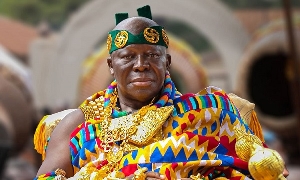- Home - News
- TWI News | TV
- Polls
- Year In Review
- News Archive
- Crime & Punishment
- Politics
- Regional
- Editorial
- Health
- Ghanaians Abroad
- Tabloid
- Africa
- Religion
- Election 2020
- Coronavirus
- News Videos | TV
- Photo Archives
- News Headlines
- Press Release
Opinions of Friday, 15 September 2017
Columnist: Isaac Kyei Andoh
Book Review: Prof Goski’s ‘Managing for Excellence in the Twenty First Century'
Over the years, students in Africa have been made to accept that doing well in school and reaching the level of higher education will qualify them for the best vacant positions in the best jobs in town.
In view of this, the first document graduates put together after school is their CV and application for employment because that is what education in Africa prepares the average student for.
This mind-set has placed a limitation on many youths’ ability to create and live on the result of their creativity.
Reading Prof Goski’s ‘Managing for Excellence in the Twenty First Century: the total quality approach, the book I call the syllabus for building the African Dream, the student is challenged to be the master of his own destiny and make the most of life based on the strength he is endowed with to impact society in a positive way.
It is a book that resonates the creativity and can do spirit in the African youth.
Just as the continent is made up of natural resources but remain poor, so is the average African endowed with so much potential but remain stuck in a certain way of doing thing that he is rarely moved to think outside the box and do things for and by himself.
The average African dies without fulfilling his full potential because she is by default mentally programmed to look for spaces created by the exit of another to fit in or in short, be a part of someone else’s dreams In Managing for Excellence in the Twenty First Century, Prof Goski Alabi brings the student to a place of self -realisation and made to see himself as an important piece of the world with a unique role to play in making this life better.
In the closing stages of the First Chapter, Prof Goski challenges people to overcome what she described as ‘’Anti-Progressive Forces That Slow Down Africa’s Development’’
She identified the ‘forces that impede Africa’s progress’ as: ignorance, the blame game and the dependency syndrome
On Ignorance
‘’In life, our actions are informed largely by what we know, the information we have at any given time, our interests, and our values. You are what you think, know, and do. The difference between a truly educated person and an uneducated person lies in the knowledge and information available to him or her and how he or she puts that knowledge and information to use. It is said that if an axe is dull and one does not sharpen the edge, one must use more strength. Wisdom brings success. That is why people who lack the requisite knowledge and competence have to use more strength and resources and still cannot be as competitive. A typical example of this is how Africa’s abilities, enrolment ratios in higher education, and development and deployment of technology compare with its developed peers.’’
On the blame game
‘’The blame game is about looking for someone or something to blame for your situation anytime things do not go well. Often people with external loci of control feel they do not have control over goal achievement, and they are therefore not psychologically ready to accept and deal with the consequences of their actions without placing blame’’
Most unemployed graduates will tell you that government is to blame for their joblessness. What you’d never hear is an unemployed blaming himself for his joblessness.
This is because to most students, their future depends on others than themselves and therefore everyone is to blame but them when things don’t go as expect.
With this mentality, most inventions wouldn’t have seen the light of day. The successful businessmen and inventors we have today are made up of many people who came to the realisation that success or failure depends on them and that no one can make their lives worth living than they could do for themselves.
Students should stop blaming the system, government and what have you and begin to ask themselves if their choices is the result of their predicament, correct the wrong and get back on track.
It is not always because of your irresponsible father, losing parents at an early age or any of the billions of the excuses people give for their failings. The truth is that there remain examples of people who made it out of worse. There’s no reason why you can’t also if you work hard and think outside the box.
The Dependency Syndrome
‘’The Bible says in Galatians 4:1 (New King James Version), “Now I say that the heir, as long as he is a child does not differ at all from a slave.”
This means that so long as the person remains a child, there is no difference between that person and a slave. A person is a child as long as he or she depends largely on others for survival.’’
Here Prof Goski is telling the youth that growth is a place of responsibility and that regardless of one’s age, as long as he is dependent on another, he can’t find his freedom.
Students should know that everything is possible if they acquire the requisite knowledge, take responsibility for their actions and know that the outcome of their tomorrow rests largely on the decisions and steps taken today.
The Story of Edwin Land
Below is and abridged version of the story of Edwin Lands captured in the book that in my estimation should encourage and challenge students and young people in our time that as long as it can be imagined, it can be done.
In 1926, Land was a Harvard student walking along Broadway in New York City. He was overwhelmed by the glare from the headlights and store signs. He sensed a safety hazard and wondered if polarized lights could reduce that danger. He dropped out of school and began doing research at the New York Public Library. Eventually, he found a laboratory at Columbia University whose window was regularly unlocked. He would climb in at night and conduct experiments. He designed the first inexpensive polarizing filters. He eventually returned to Harvard and was provided a lab to do further research.
There, Land shared his vision with his physics teacher, and they created Land-Wheelwright Laboratories. In 1934, Eastman Kodak gave Land-Wheelwright an order for $10,000 worth of polarizing filters. Kodak wanted a polarizer laminated between two sheets of optical glass, but neither Land nor Wheelwright had any idea how to make it. Nonetheless, they accepted the order and successfully created what they called the Polaroid, which would later become the name of their company. Although the initial major application was for sunglasses and scientific work, it quickly found many additional applications: colour animation, 3D movie glasses, tinted windows, and more.
Every invention, business or contribution that has made the world a better place started from imagination.
Thankfully for us, we find ourselves at a time when access to information is limitless and therefore, ignorance is no longer a circumstance but a choice. This is the message of Prof Goski Alabi, Ghana’s first Professor of Quality Management and Leadership to the youth and student of this country. Let’s do it











